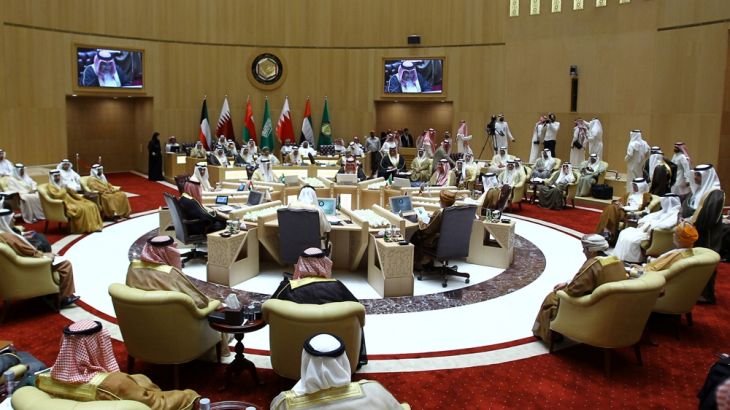GCC and EU compared: How they work and why they exist
A look at the differences and similarities between the Gulf Cooperation Council and the European Union.

“I am very pleased to know that the GCC summit is happening, after having pushed for a resumption of that for quite some months now,” EU High Representative Federica Mogherini said on December 4, in advance of the 38th Gulf Cooperation Council (GCC) summit hosted by Kuwait on December 5.
It is “a very positive sign” Mogherini added.
The GCC is a political and economic alliance of six countries in the Arabian Peninsula, which, like the European Union (EU) aims at fostering political and economic ties between the member states.
Al Jazeera examines the differences and similarities between the two.
Why was it founded?
GCC
- Composed of six Arab Gulf member states – the United Arab Emirates (UAE), Bahrain, Saudi Arabia, Oman, Qatar and Kuwait – the GCC is bound by shared history, geography and borders.
-
It was created in 1976 and its charter signed in 1981, with an aim to generate integration and inter-connection among member states.
-
The GCC charter establishes the basic objectives of cooperation in the areas of economic and financial affairs, commerce, customs and communications, education and culture, social and health affairs, information and tourism, legislative and administrative affairs, and science and technology.
EU
- The EU is an intergovernmental and supranational union of 28 member states, created with the aim of ending the frequent conflicts between neighbours that led to World War II.
-
The fundamental purpose of the EU is to promote better social, political and economic harmony among its nations.
- The Maastricht Treaty in 1992 created the EU.
Who leads it?
GCC
-
The Supreme Council is the supreme authority, consisting of the heads of member states. Its presidency rotates among member states.
-
In recent decades, the secretary-general post has been held by Kuwait’s Abdullah Yaagoub Bichara (May 1981 – April 1993), the UAE’s Fahim Bin Sultan Al Qassimi (April 1993 – April 1996), Saudi Arabia’s Jamil Ibrahim al-Hejailan (April 1996 – March 2002), Qatar’s Abdulrahman bin Hamad al-Attiya (April 2002 – March 2011), and Bahrain’s Abdullatif bin Rashid al-Zayani (April 2011).
EU
- The main institutions of the EU are each headed by a president.
-
European Parliament President Antonio Tajani was elected by members of the European Parliament; European Council President Donald Tusk was appointed by EU leaders; and European Commission President Jean-Claude Juncker was appointed by national leaders with the approval of the European Parliament.
Where is it based?
GCC
- The GCC’s headquarters are located in Riyadh, but meetings can be held in any of the six countries.
-
The GCC Commercial Arbitration Centre is located in Bahrain.
EU
-
The EU’s institutional framework takes seven institutions into consideration.
-
The European Parliament is located in Brussels, Luxembourg and Strasbourg, France; the European Council, Council of the European Union, and European Commission are in Brussels; the Court of Justice of the European Union is in Luxembourg; the European Central Bank is in Frankfurt, Germany; and the Court of Auditors is in Luxembourg.
How does it work?
GCC
- The GCC meets once a year for its regular session and can hold extraordinary sessions at the request of any member, if this is seconded by another member.
-
The secretary-general, selected by the Supreme Council, is responsible for preparing special studies relating to cooperation, coordination, planning and programming for common action. Eight assistant secretary-generals deal with political, economic, military, security, humanitarian, environmental, legal, media and cultural affairs, along with information, finance, dialogue and negotiations.
-
The GCC’s defence planning council coordinates military cooperation between members.
-
After the Supreme Council, the Dispute Settlement Commission is the most important organ. It is constituted by the Supreme Council for any dispute arising out of interpretations of the charter.
- The Ministerial Council, composed of the foreign minister of each member state, is in charge of formulating policies and making recommendations to promote cooperation among member states.
EU
- The Treaty of the European Union refers to seven EU institutions, several of which are responsible for drafting policies and taking decisions.
-
In addition, the Court of Justice is responsible for ensuring that community law is observed, while the Central Bank works to maintain price stability and the Court of Auditors examines revenue and expenditures.
How are disputes solved?
GCC
- The GCC Commercial Arbitration Centre was launched in 1995, with the aim to promote arbitration and dispute resolution procedures among GCC members.
-
The centre – which is based in Bahrain, but considered independent from all of the six member states – does not administer a high volume of cases.
- Politically, there is an absence of mechanisms to resolve disputes between member states in cases of disagreements, Al Jazeera’s Centre for Studies has noted.
- No institutional activities or structures have yet been created to follow up on the implementation of resolutions taken at past GCC summits.
-
A 2014 diplomatic rift involving Saudia Arabia, the UAE, Bahrain and Qatar did not escalate after Kuwait stepped in to mediate.
-
Since June 2017, Qatar has been blockaded by Saudi Arabia, the UAE and Bahrain, after failing to acquiesce to a list of demands that included shutting down Qatar-based Al Jazeera.
EU
- The Commission must be aware of new situations or problems developing in Europe and assess whether EU legislation is the best way to deal with them.
-
The Commission is in touch with various groups, the European Economic and Social Committee, and the Committee of the Regions. It also takes into account the opinions of national parliaments, governments and the public.
- The Commission will only consider action at the EU level if it finds that a problem cannot be resolved by national, regional or local actions.
-
If the Commission concludes that legislation is needed, it drafts a proposal.